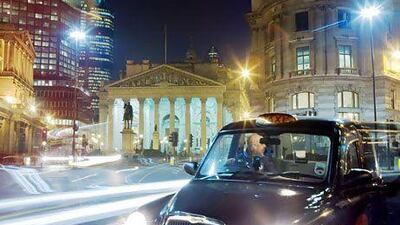If visitors to London are finding it harder than usual to hail a taxi, there are two good reasons.
First, some 400 black cabs - as familiar a symbol of the capital as Big Ben, St Paul's Cathedral or the Houses of Parliament - had to be recalled because of a steering defect.
With 24,000 licensed taxis serving London, the loss of even that number of vehicles from the total fleet would have been manageable.
But there was worse news to come for users of this important means of getting around the city.
Manganese Bronze, the company most closely associated with making the modern generation of black cabs, went into administration last month, the latest casualty of harsh market conditions.
With sales of new vehicles frozen, and 600 cabs due to be retired under regulations forcing cabs off the road once they are 15 years' old, the shortage between now and Christmas suddenly looks more serious.
For many members of the Licensed Taxi Drivers' Association, representing 10,000 drivers in London, the vehicle recall and the non-availability of new models have caused a loss of livelihood at the worst possible time.
"There is not a cab to be had on rental for those affected," says Steve McNamara, the association's general secretary and a licensed cab driver for 28 years.
"Drivers find themselves unable to work and therefore with no income to meet mortgages and other household bills or prepare for Christmas."
And with the busy festive period approaching, late-night revellers whose parties do not end until after the last London underground trains run, as well as shoppers and business clients, must expect longer waits for a cab to come along with its rooftop sign illuminated in yellow or orange to indicate it is available.
If Manganese Bronze rings no immediate bell as the maker of London black cabs - it started out manufacturing ships' propellers and was later absorbed into the Villiers motorcycle company - it has a self-explanatory trading name, the London Taxi Company.
But the history of production is more complicated. The present black cab, as it has continued to be known despite now being designed in a variety of colours, dates from 1948 when Carbodies built it in partnership with Austin and Mann & Overton.
Some 7,000, destined mainly for London, left production lines in the English Midlands city of Coventry in the first 10 years. Trade grew briskly and after more than 60 years, the total built now stands at 130,000. In 2006, a joint venture with the Chinese motor company Geely led to a deal to produce export models in Shanghai with Coventry still supplying the UK market. But as recession hit Britain hard, Manganese Bronze also began to face a steady loss of its black cab market share to a competitor, the Mercedes-Benz Vito. The problems were aggravated when Geely decided two years ago to call off plans to boost its stake in Manganese from 20 to 51 per cent.
The appointment of PricewaterhouseCoopers (PwC) as administrators was announced on October 30, less than three weeks after the recall of vehicles.
PwC said the move was due to a combination of "poor UK sales, supply chain issues, and high warranty costs". Trading difficulties had been compounded earlier this year when £3.9 million (Dh22.9m) hole in accounts, caused by past losses being underestimated, was identified. The delayed half-year eventually showed a pre-tax loss of £4.6m with sales down 11 per cent.
More than 150 jobs were lost immediately after the company went into administration with more than 100 more under risk unless a buyer is found.
Lloyds, which stood to lose substantially if taxi drivers defaulted on purchase loans with its Black Horse division, stepped in to ensure funding for the defective steering to be remedied. "We are working to get taxis back on the road as quickly as possible but clearly, with the large number of vehicles affected in London and also in the regions, this work will take several weeks to complete," says Matthew Hammond, Manganese's joint administrator and a PwC partner.
Hundreds of new models still waiting to be registered, once the voluntary suspension of sales is lifted, will be fitted with the new components and available for distribution from early in the new year.
Mr Hammond says sufficient dealership, head office and production staff have been retained to "address the operational, technical and financial circumstances that the business faces".
He recognises the impact on the trade. "I fully appreciate the difficulties the recall has created for individual taxi drivers, fleet operators, dealers and availability of taxis in the London black cab market," he says. "I hope that within a matter of weeks we will have addressed the main difficulties faced by drivers and the under-supply of vehicles to the London black cab market.
"We are working to get taxis back on the road as quickly as possible but clearly, with the large number of vehicles affected in London and also in the regions, this work will take several weeks to complete."
Mr McNamara remains optimistic for the longer term future of black cabs. "I am in daily contact with the administrators and while they are not naming interested parties, there are household names involved and in some cases it has reached the stage of due diligence.
"The great shame is that Manganese Bronze had just about sorted out past problems of dreadful customer service. What we need now is someone to come in with money to produce and invest to get things right and the commitment to ensure long-term continuity."


